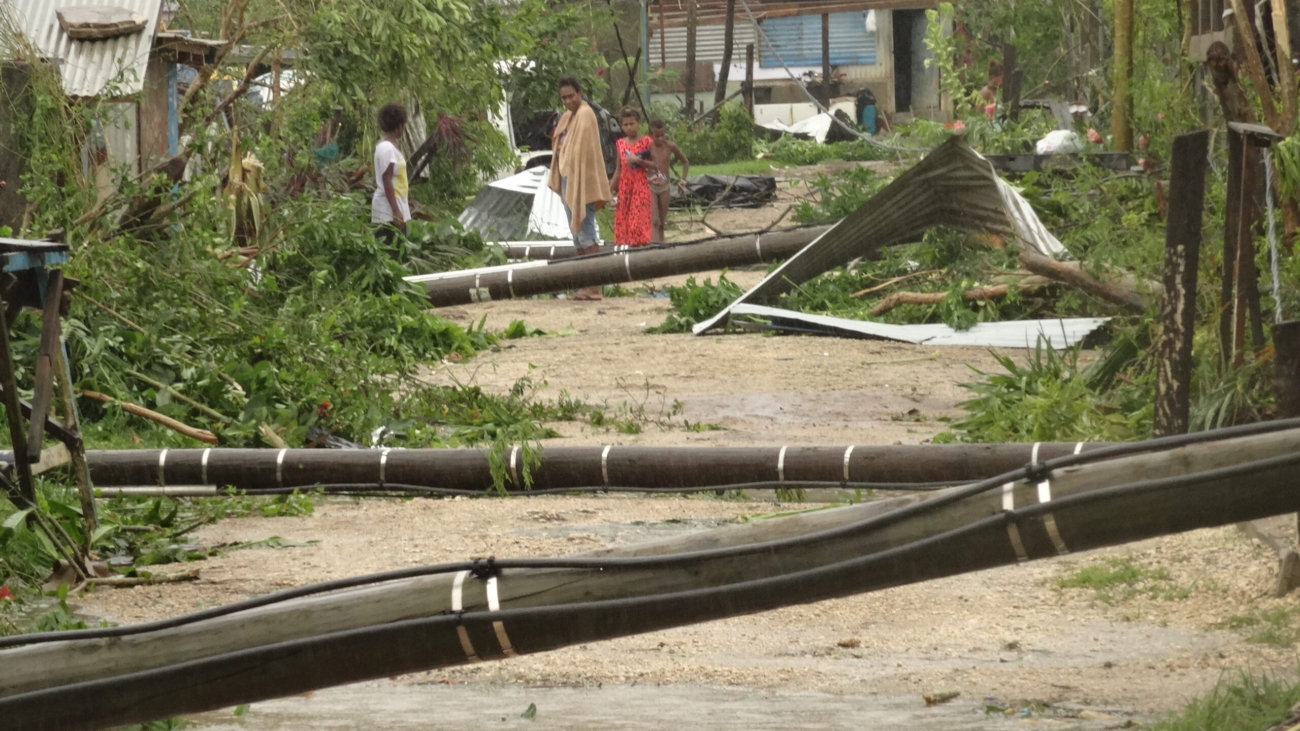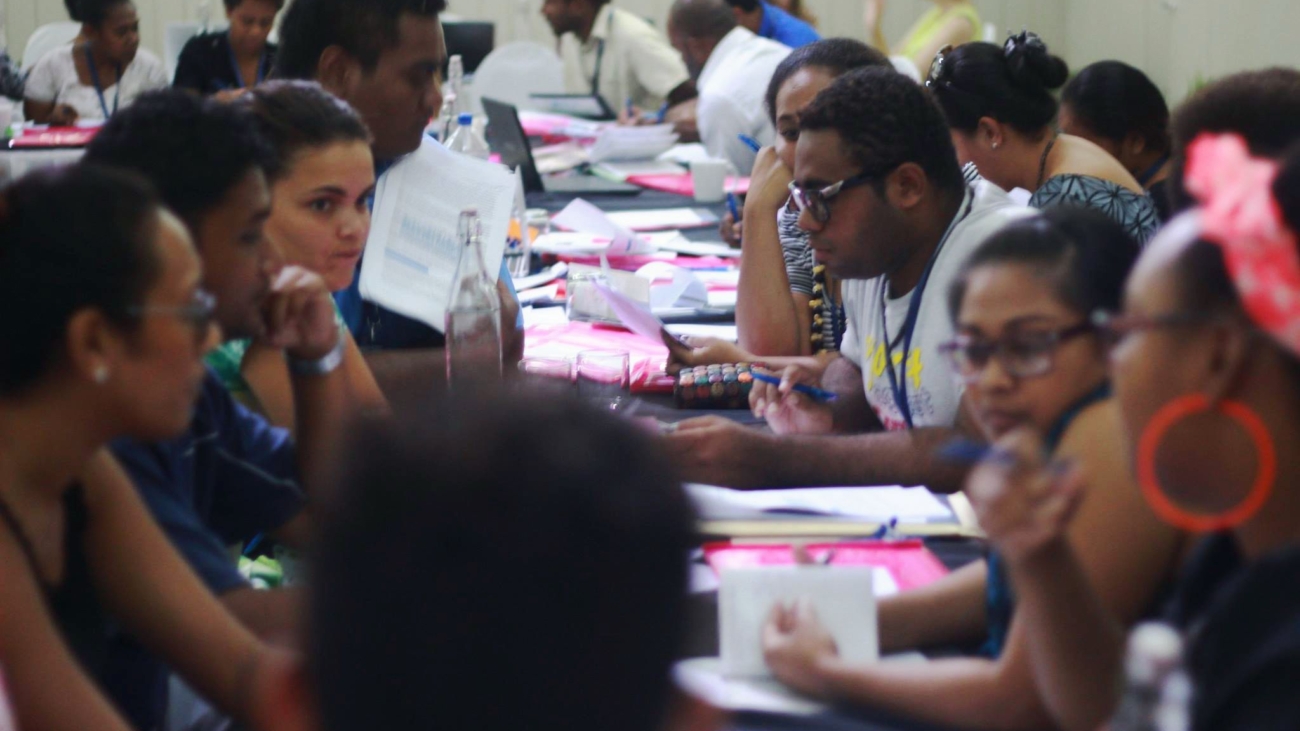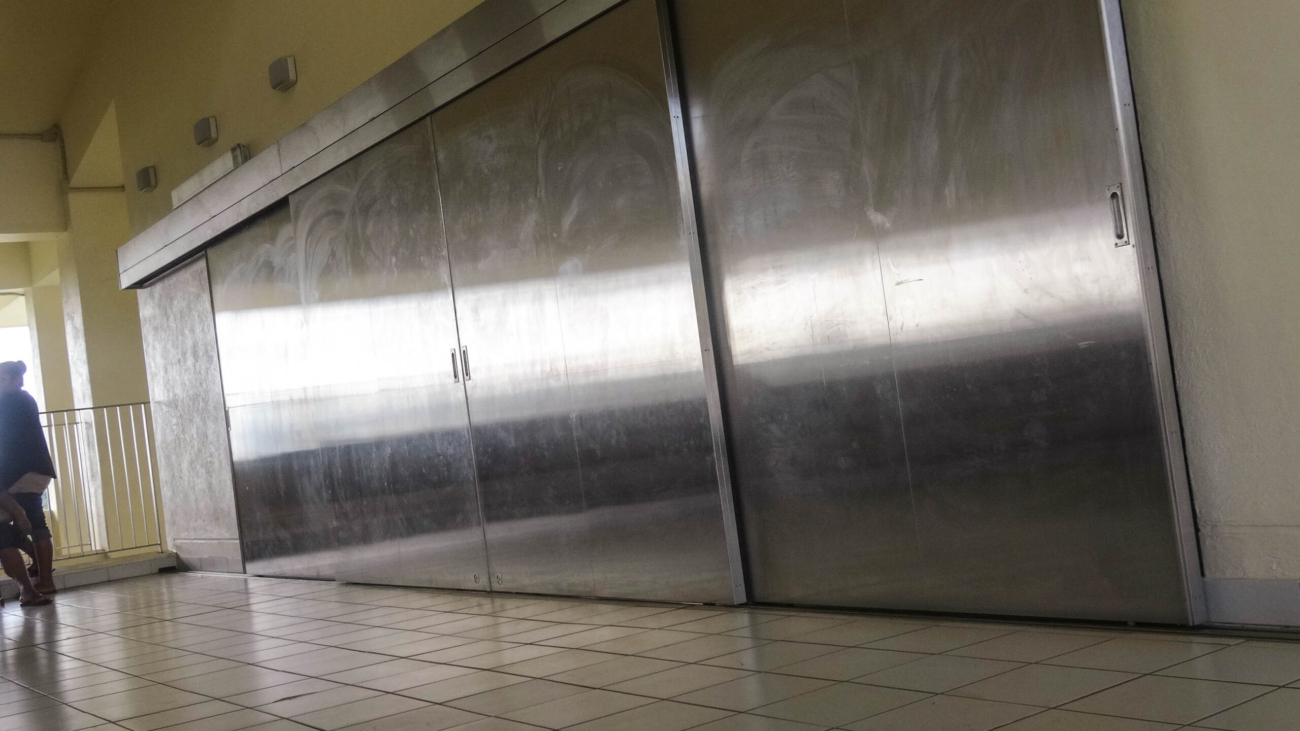On the first day of the hearings, all the government statutory bodies summoned to the parliament have failed to satisfy the Public Accounts Committee (PAC).
No To Favourism & The Unfair Distribution Of AID – CYCLONE PAM DISASTER
Cyclone Pam left a trail of destruction and debris in Vanuatu, blocked roads, missing roofs, and damaged infrastructure. In just one night thousands of lives have been affected…
Pacific Youth Must Unite Against Corruption
BREAK THE CHAIN OF CORRUPTION
OVER 30 YOUTH leaders representing 14 pacific island nations (Cook Islands, Fiji, Federated States of Micronesia, Kiribati, Nauru, Palau, Papua New Guinea, Republic of the Marshall Islands, Samoa, Solomon Islands, Tonga, Tokelau, Tuvalu and Vanuatu) took part in the first ever Pacific Youth Forum Against Corruption from 22 – 24 February at the Novotel Hotel, Nadi, Fiji.

The Pacific Youth Forum Against Corruption was organised by the United Nations Development Program (UNDP), the United Nations Office on Drugs and Crime (UNODC), and the Pacific Youth Council.
Vanuatu was represented by Kevin Henry (Transparency international Vanuatu), Prescila Meto (Youth Against Corruption Vanuatu), Mini Miliu (Youth Challenge Vanuatu) and Deffnie Thompson (Vanuatu National Youth Council), the Minister of Lands, the Honourable Ralph Regenvanu also participated in the forum as a presenter.
During the forum it was clear that corruption is a primary obstacle that needs to be addressed more effectively, it was also agreed that the pacific region needs to improve and to initiate more effective efforts by different institutions that are addressing corruption, as this could be instrumental in combating corruption right down to the grassroots level..

With regards to youth groups and advocates, it was emphasized that there is the need for more networking and the sharing of ideas regionally. For example, an anti-corruption tool that is being used in Vanuatu could be more effective in Palau while a program that is being implemented in Papua New Guinea would achieve greater success if done in Vanuatu, thus the sharing of ideas, contacts, tips, and support becomes a vital vein to a more competent and effective push to drive out corruption in each island nation, and to stand united in the region against corruption.
From the anti-corruption forum, the young leaders recognized there is a “limited, or no access to regional or country-specific data and policies relating to corruption (reflecting the need for evidence research based on corruption) due to lack of freedom of information and lack of innovation and independent media reports”, as stated in the forum outcome statement which is still in its draft stages.
It was also acknowledged that “difficulty with regards to sustainability of initiatives on anti-corruption such as youth movements against corruption due to lack of funding geographical isolations” creates a barrier to anti corruption efforts by active youth groups.
 Today, the youth population in the pacific participate in all the sectors of society; they are police officers, pastors, to even becoming members of parliament. While some youth are fortunate to be awarded scholarships to study overseas, the majority of youth stay back. If you are lucky you can get opportunities to participate in local workshops, youth programs and even get a good job, but some unfortunate groups become vulnerable, and they participate in negative activities, involve in crime, allowing the society to regard them as deviants; a barrier to community development.
Today, the youth population in the pacific participate in all the sectors of society; they are police officers, pastors, to even becoming members of parliament. While some youth are fortunate to be awarded scholarships to study overseas, the majority of youth stay back. If you are lucky you can get opportunities to participate in local workshops, youth programs and even get a good job, but some unfortunate groups become vulnerable, and they participate in negative activities, involve in crime, allowing the society to regard them as deviants; a barrier to community development.

It is widely and commonly said that youth are the leaders for tomorrow, therefore it is important to note that whatever experience that youth go through during their upbringing will contribute a lot to how they will define, and present themselves when they hold high and important positions in the community, and nationally. Therefore more informal and local programs need to be developed to assist in promoting a good environment where young people are nurtured to avoid criminal activities.
Transparency International Vanuatu (TIV) has been offering such programs to young people across Vanuatu, through TIV’s Civic Education Program TIV has identified certain factors that continues to encourage young people to keep silent against bad practices.
Firstly, the lack of trust in the political system; TIV asked a young person if he voted in the 2012 general election, and this was his response,
“No, I did not vote, I did not want to waste my time on those candidates. Do you realise what is happening? They promised us ‘no more motions of no confidence’, and look what they have done,”
this statement speaks for a lot of young people, the lack of trust and broken promises creates an environment where uncertainty becomes fact, when young people look towards an uncertain political future they become vulnerable to certain negative practices. TIV has, and will continue to encourage active citizenship, because an effective democracy is the result of a participatory process, everyone has to be involved, even young people.
Secondly, the lack of understanding on citizens basic rights and duties; over the years TIV has delivered hundred of constitution booklets to young people, and in the process informing them of their rights, that if violated, are eligible to lodge their complaint or statement to the appropriate authority.
Transparency International Vanuatu is still offering the Civic Education Program to interested youth groups and communities, call 25715, or email transparency@vanuatu.com.vu to request a workshop or to share your comment. You can also find TIV on facebook: https://www.facebook.com/transparency.vanuatu
Concerns Over Vila Central Hospital Equipment’s
TIV was told that three weeks ago a new ultrasound machine worth VT10 million broke down, and unfortunately it still has not been fixed to this today.
The Mautoa Park Petition

The Prime Minister is expected to receive the Mautoa Park Petition on Friday 20.
The number of signatories recorded on the Mautoa Park petition has apparently increased to over 3,000 since the petition was launched almost 2 weeks ago, on 7 February, as reported to TIV.
What is a petition?
A petition is a formal written request, typically one signed by many people, appealing to the concerned authority with respect to a particular cause. Petitioning is a powerful tool, and a peaceful way of uniting different people from different backgrounds to stand up against a system, or an event that is regarded by the people as not productive, unhealthy, one sided, or corrupted.
For instance, in 2012, in the United Kingdom a local called Peter Jackson from Fife started a petition after the Fife Council announced the closure of Eden Park, which is a respite centre for children with special needs.
“Please support our petition to prevent Fife Council from closing Eden Park Children’s Respite Centre, The centre provides much needed respite to special needs children and their families,” petitioned the locals.
Fife Council had announced the closure of the centre without consultation with families or staff at the centre. The locals found out about the closure via the media.
They stated that the “action taken by the council is wrong and should be reversed. The children use Eden Park regularly…the children interact with other children in a safe and friendly environment that would not otherwise be afforded.”
In 2013 Peter Jackson reported success. “Thank you to everyone who signed and supported this petition. Fife Council have today sent letters to all the families associated with Eden Park informing them that the facility is remaining OPEN. Your continued support throughout this long and arduous process was greatly appreciated. Thank You.”
(Source: http://www.gopetition.com/success-stories/322/eden-park-children-s-respite-centre-saved.html)
The Mautoa Park Petition
With over 3,000 signatories The Mautoa Park Petition carries a unified representation. Transparency International Vanuatu was told that during a meeting at Mautoa Park this week by the community, it was confirmed that the Prime Minister is expected to receive the petition today, Friday 19.
Despite the allegations of extortion and misappropriation over the management of Mautoa Park, it is interesting that the community have rallied together to “keep the green space along with its management, with the community”.
The Victims & Good Management
From a point of view, it is a rather complicated situation in its own terms, with exchanges of comments on social media and reported misunderstandings, confusions, and allegations.
As a fact, corruption within the community is as rotten as corruption at the national level, it is that idea of ‘knowing that it is wrong, but you do it anyway, and only a few will benefit from it’.
Consequently, the vendors, and the members of the community became the victims when the tables were over turned. Transparency International Vanuatu (TIV) has always been advocating against bad practices and corruption, and through its Advocacy & Legal Advice Centre (ALAC), has spoken and followed up on cases on behalf of victims of corruption.

Apart from Mautoa Park TIV has also received complaints regarding the loud noise that were emitted by different groups at the AVL Stage at Freswota field, the sound from the speakers could be heard as far as the Ohlen Whitewood area, clearly this act was already in contrast with the law but nothing was done. The Pollution Control Act of 2013, Part 4, Section 19 states that the:
‘Discharge or emission of pollutants from premises (1) A person must not discharge or emit pollutants from any premises on or onto any land, body of water, foreshore or air so as to result in: (a) unreasonable interference with the health, welfare, or amenity of any other person; or (b) any adverse effect on the environment. (2) A person who contravenes subsection (1) is guilty of an offence punishable on conviction: (a) if the person is an individual – by imprisonment for not more than 12 months, or a fine not exceeding VT4,000,000, or both; or (b) if the person is a body corporate – by a fine not exceeding VT8,000,000.
Therefore, if a person or group is causing discomfort to another person by way of emitting any of the pollutions mentioned above, they are breaking the law, thus they are punishable by imprisonment or a fine. Unfortunately, nothing has been done.
TIV would like to stress that good management of such community institutions must always be a priority. If the groups that had been tasked with managing the market or the AVL stage had not reached the expected expectations, then why did it take too long to intervene? Was there a possibility that the authorities could step in to run several management, and business programs with the community? If there was some form of mentoring program in place that would assist in upgrading management skills, would the story be different? Yes!
It would be interesting to see how the Prime Minister responds to the community petition, given the fact that his government is made of several coalitions, and that he is also the Chairman of the Council of Ministers who approved of the signing over of Mautoa Park and the Freswota Field.
Transparency International Vanuatu advocates against corruption, supports good decision making and promotes good governance in Vanuatu, TIV would like to encourage our leaders, nationally and at the community level, to prioritise the welfare of the people and to work towards a corrupt free, and good governing ideals that will benefit everyone and not only a few.
Unhappy Patients Voice Their Concerns
“Our children are suffering yet we have to wait for those doctors and nurses to be on time to give us the treatments needed,” said the mother.
Empty Tables, Empty Pockets
“I hope that when this petition gets to the Honorable (PM) Joe Natuman, I challenge him, to make sure that this (Mautoa Park) does not get out,” challenged the Opposition Leader.
TI Pacific Media & Advocacy Workshop
The Transparency International Asia Pacific Regional Program organized the Pacific Media and Advocacy Workshop this week in Port Vila, Vanuatu.
“Of course 1 or 2 MPs are going to benefit from it, but not the country”: PM
The Prime Minister stated that the agreement was over 90% of foreign interest, he said that he was surprised that even Vanuatu’s legal professionals did not notice this. Asked if whether the agreement would be beneficial for the country the Prime Minister replied, “of course 1 or 2 MPs are going to benefit from it, but not the country.”
National Integrity System Report for Vanuatu Launched

Thursday the 17th of July marked another achievement for Transparency International Vanuatu (TIV). In front of members from the diplomatic community, NGOs and government officials the Interim Chairperson of TIV, Dr. Willie Tokon, launched the National Integrity System Assessment Report (NIS).
“It is good to see that the Leader of the Opposition is here”, began the Interim Chairperson in his statement, “at least one MP (MP
Robert Bohn) is here. I am very disappointed that we do not have the Prime Minister here or his designated representative” explained Dr. Tokon. “I would like to take this opportunity to thank all of you, everybody who has done this, been part of it. Everybody who is here today to see the launch…
…in this few words I now give you the people of Vanuatu, the National Integrity System report”, the guests applauded the moment before stepping outside for refreshments.
It had taken the research team just a year and a month to complete and publish a report that usually takes more than twice or thrice that amount of time to complete. One of the speakers of the event, former TIV Chairperson, Marie Noelle Ferrieux Patterson, emphasized on this point and acknowledged the research team for their tireless effort.
Among the speakers was the Leader of the Opposition, the NIS Lead Researcher Anita Jowitt, and Dr. Srirak Plipat who is the Transparency International Regional Director for Asia Pacific. He mentioned that Vanuatu is among other countries like Nepal who have recently launched their NIS report; he continued to state that political instability is one of the biggest challenges being faced today by national governments.

The NIS is a tool with recommendations that addresses facts that affect the integrity of Vanuatu, these recommendations can be adapted by leaders in their decision making to make sure that institutions are strengthened, and that effective anti-corruption laws be introduced and thoroughly implemented.
On page 58 of the report it explains that ‘changes in government make it difficult for the executive to embark on and adhere to a comprehensive anti-corruption law reform agenda, and also make it difficult to assess the degree to which there is commitment for such an agenda.’ In other words, it describes that the political instability that we are continuously experiencing is a barrier to achieving a corruption free Vanuatu.
The following page in the report provides some recommendations to this context, the ‘liberal use of motions of no confidence without sound reasons based on national interests is the mechanism that creates instability with the executive. However, a blanket limitation on motions of no confidence for certain periods of time prevents their legitimate use in cases of bad governance.”
Basically, the report simply identifies areas within the national and civil institutions that need to be strengthened, and then it provides recommendations on how to do it. Paragraphs after paragraphs of thoroughly researched data are carefully laid out in this 236 page report.
“We have not come here to finish something; we have come to start something,” stated one of the speakers during the launch. That is definitely what TIV is looking forward to because the launch marks a beginning which TIV and other institutions can walk forward together.
The National Integrity System Report is available to the public, TIV would like to advice the public that if you are interested in getting yourself a copy of this report please send your request to this email address: transparency@vanuatu.com.vu, or you can come to the office with your flash drive to get an e-copy.









